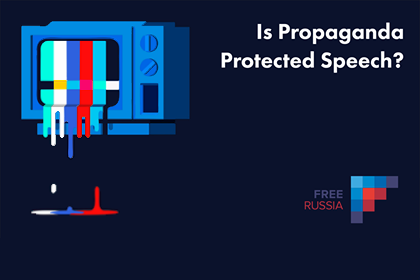On June 28, 2019, Free Russia Foundation hosted a conference Finding Practical and Principal Approaches to Countering the Kremlin’s Influence Campaigns While Upholding Sanctity of Free Speech at the Hague, Netherlands.
On June 28, 2019, Free Russia Foundation hosted a conference Finding Practical and Principal Approaches to Countering the Kremlin’s Influence Campaigns While Upholding Sanctity of Free Speech at the Hague, Netherlands.
See the full agenda
Download the speakers’ bios
https://youtu.be/jMB2xIKQTMo
At the conference, FRF unveiled a new report by the Congressional Research Service Limits on Freedom of Expression, which examines the scope of protection extended to freedom of speech in thirteen selected countries: Argentina, Brazil, Canada, China, France, Germany, Israel, Japan, Netherlands, New Zealand, Sweden, Ukraine, and the United Kingdom. This report focuses on the limits of protection that may apply to the right to interrupt or affect in any other way public speech. It also addresses the availability of mechanisms to control foreign broadcasters working on behalf of foreign governments.
Panelist for this conference included moderators Leon Willems, Michael Weiss, Kristina Vaiciunaite, and Daniel Mitov, as well as, many other human rights activists, legal experts, authors, journalists, media experts, etc. who weighed in on the concept of protected free speech and worked together to articulate measures for countering disinformation.
The event was punctuated by the keynote remarks delivered by David Kaye, UN Special Rapporteur on Freedom of Speech, and Richard Hoogland, D66 Board member International Cooperation.
Panel One
Panel one featured presentations by Leon Willems, Roman Dobrokhotov, Vasily Gatov, Luke Harding, Thomas O. Melia, Peter Pomerantsev, and Olga Romanova who discussed practicalities of finding a balance between protecting free speech and combating disinformation campaigns by Russia. Speakers highlighted the limits of fact-checking. According to the new evidence from neuroscience research, audience rejects the corrected information once the disinformation has previously been delivered. Instead speakers suggested contracting propaganda with personalized positive stories that affect emotions rather than the rational mind. It is also critical to follow strict guidelines of providing accurate information and avoid acting like Russian sources. Finally, there was a consensus on the panel that media too shares a responsibility as an agent of democracy for what types of narratives it highlights regularly (negative over positive).
Panel Two
Speakers of the second panel included victims of the Kremlin’s disinformation campaign: Vladimir Kara-Murza, Marina Litvinenko, Alena Balaba, Tatiana Gerasimova, Martin Kragh, Ilona Sokolova, and Liz Wahl. The discussion examined real cases of individuals targeted by Russian-state sponsored disinformation campaigns and the effects it had on them personally and the defense strategies they used against it. The speakers discussed the role the Kremlin played in labeling those who disagree with its policies as traitors and how that has dehumanized them and put a target on their back. Martin Kragh shared stories of victims of disinformation who had to deal with loss of jobs, threats against their lives and the lives of their families.
Panel Three
Jens-Henrik Jeppesen, Oleg Kozlovsky, Jeremy Lamoreaux, Joanna Szymanska, Nathalie Vogel, and Ilya Zaslavskiy spoke on the tactics and mechanisms of disinformation, and examined ways to protect social media platforms and the impact of inauthentic digital content. The discussion included evaluation of the current EU Commission’ approach to disinformation such as defining the disinformation narrowly as verifiably false information designed to mislead the public for political or commercial reasons and its inclusion in the code of conduct. Although the collaboration efforts among the EU member states against propaganda have been remarkable, panelist agreed on the critical need to expand coordination beyond the countries in the EU. Oleg Kozlovsky highlighted the importance of raising public awareness of the disinformation campaigns, particularly among the children and following the example of Finland, which recently introduced strategies for reading newspapers in the curriculum.
Panel Four
The fourth panel speakers Ralf Fuecks, Jelger Groeneveld, Padraig Hughes, David Kaye, Miriam Lexmann, Scott Martin, and Marko Mihkelson discussed legal and policy mechanisms for combating state disinformation. While for the nations within the European Union the mandate to uphold freedom of speech, freedom of religion, freedom of assembly, dominates the discussion: there are certain limits and legal precedents where speech is either infringed upon or not well defined. The speakers in this panel, all legal and human rights experts, addressed the clash of enumerated individual speech rights against the boundaries of collective rights of a state actor; and discussed cases where states and other governing bodies such as the U.N. and the E.U. had established limits on hate speech, defamation and libel, and articulated anti-obscenity laws; because of these established limits and precedents it can be used to limit the harm rendered by state-sponsored propaganda. Finally, the panelists articulated legal recourse options available to those targeted by disinformation campaigns. Padraig Hughes, for example, weighed in on the litigation around defamation without harming free speech tenets, which is more nuanced than legislating. David Kaye raised the issue of legislating transparency such as the rules and nature of enforcement. Miriam Lexmann brought attention to the underlying problem and incentive of disinformation which is that disinformation is a business model: It does not serve local interests but rather seeks to reap profit. Similarly Scott Martin discussed that disinformation bases itself off of an economic model but he calls for regulation to deal with these issues, specifically international regulation.
The conference was followed by a closed working lunch moderated by Melissa Hooper, to gather and solidify concrete policy recommendations. The discussion focused on finding recommendations on how to combat Russian propaganda and disinformation efforts. The attendees articulated strategies for countering state-sponsored propaganda all while having to maintain a balance between upholding free speech and limiting the damage of disinformation campaigns. They then evaluated whether the existing law can be used to establish limits on damaging speech and the need for new remedies to curtail the purveyors of propaganda.


